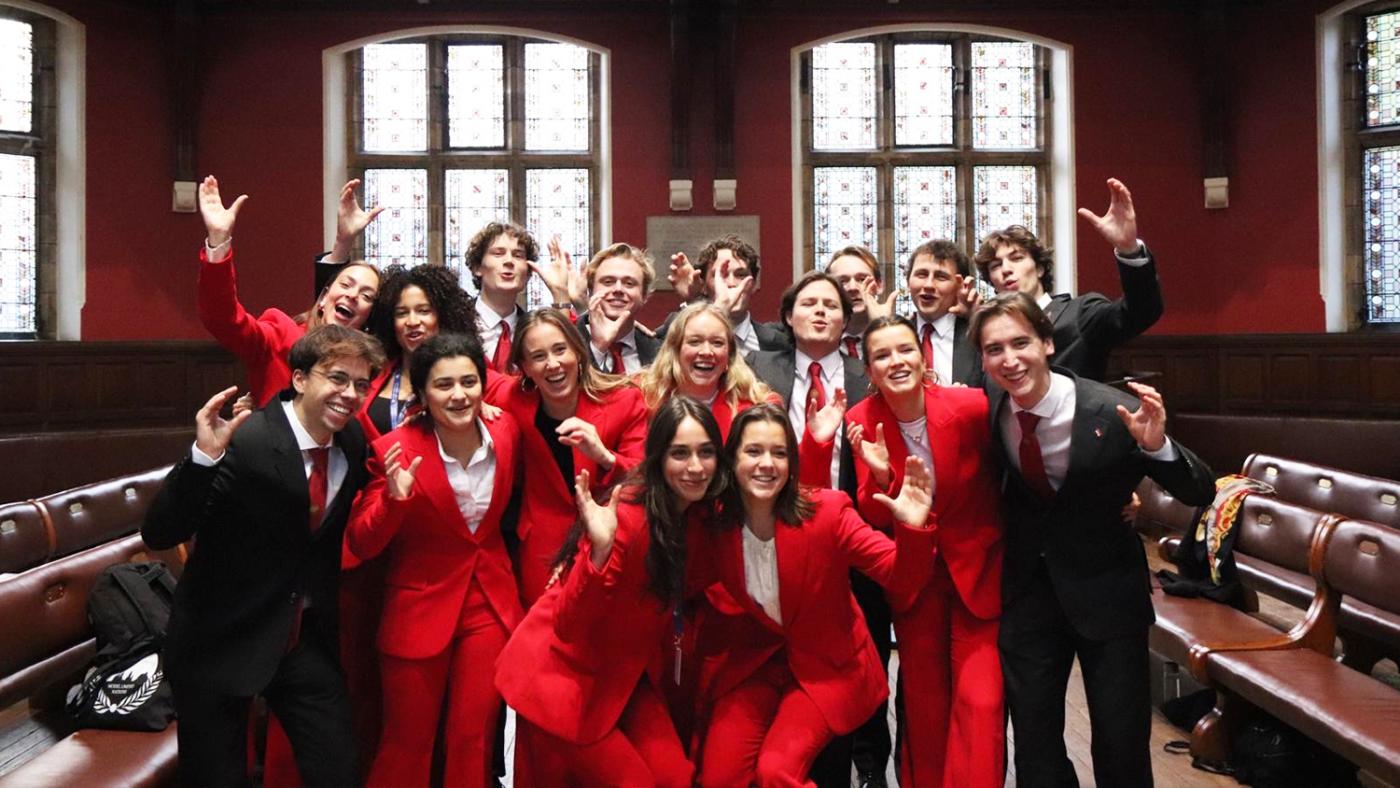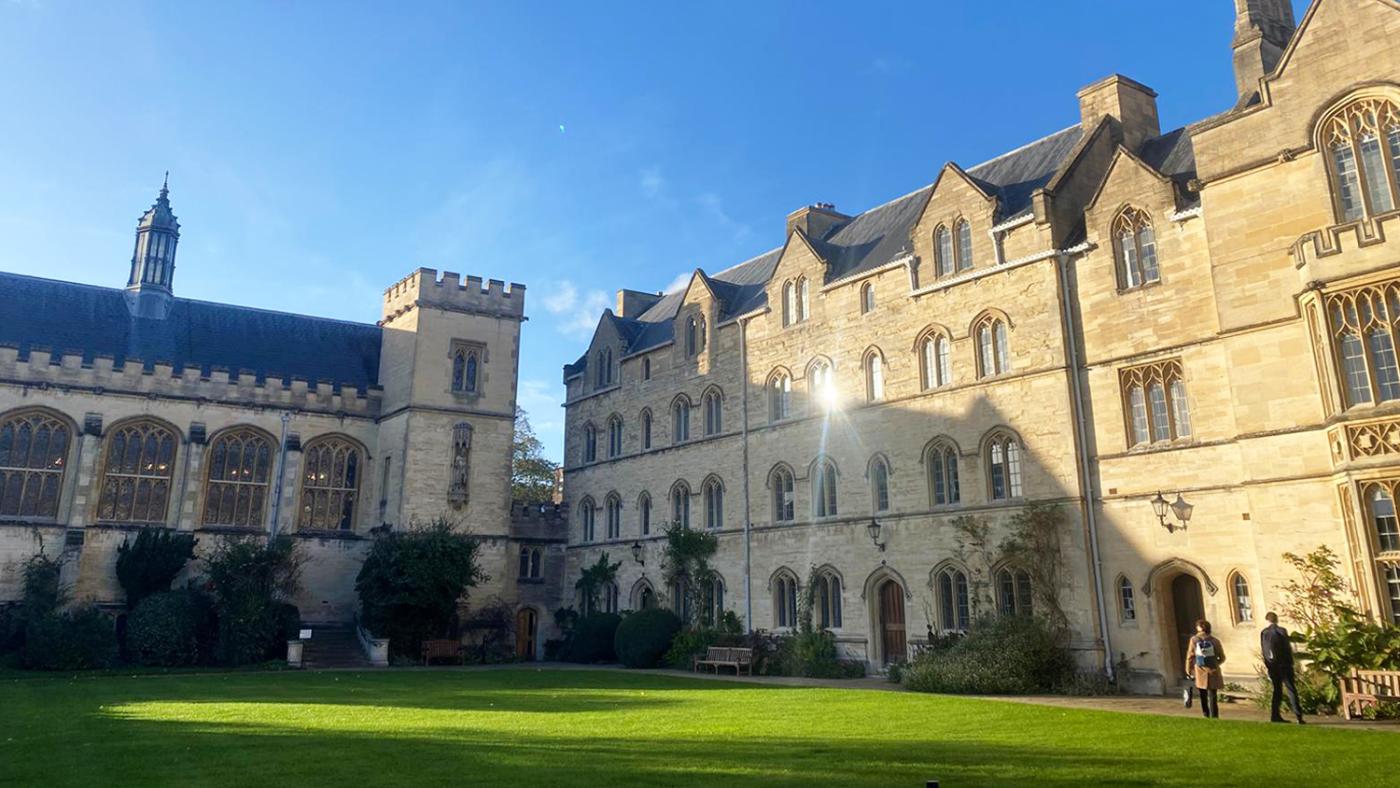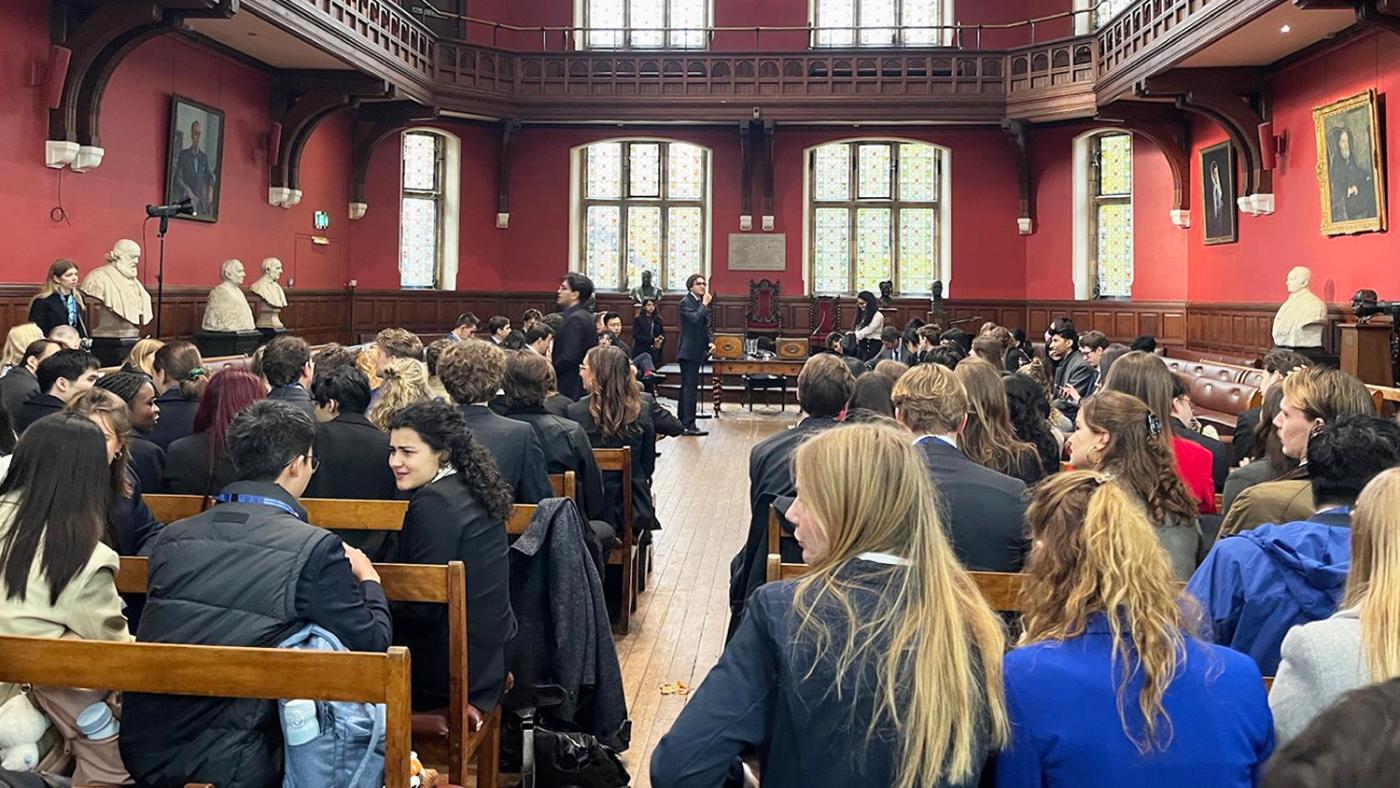Short nights at international diplomacy competition in Oxford
UUMUN puts Utrecht on the map during the OxIMUN

“I hereby declare the 21st edition of the Oxford International Model United Nations open!”
A gavel resounds through Oxford Union Hall as the president of OxIMUN kickstarts the new edition on Friday morning, 31 October. Approximately 150 students of different nationalities (including groups from the US, Australia and China) and academic backgrounds are gathered in the hall. With our red clothes and ties, we stand out among all the students in suits. There is a slight tension in the room. Since the summer, we have been working towards this competition, practising countless times with convincing speeches and negotiation techniques. Now, it is finally about to begin.
OxIMUN
Since 2010, the student group UUMUN has been travelling by train to OxIMUN every year. From Friday to Sunday, we are no longer Dutch. Instead, each of us represents a random country in a simulation of various United Nations committees. I have been assigned to the Economic and Social Council (EcoSoC) alongside three other UUMUN members, and I'm supposed to represent Saudi Arabia.
After the opening, which includes a speech by a Hungarian ambassador, people start networking immediately. Actually, the lobbying had already started before the opening ceremony, in the so-called “pre-lobby”. While waiting to enter, everyone talks to each other, asking where people come from, which committee they are in, and which country they represent. Committee members also find each other, then someone comes up with a link for a WhatsApp group. Anything to make a good impression and hopefully forge some bonds.

Our committee sessions are held at Pembroke College, a building that resembles a castle. The topic under discussion in our committee is: Sanctions and the impact on Sustainable Development Goals. In Iran and Venezuela, sanctions (from the United Nations or otherwise) have had a major impact on the population, which is not in line with the objectives of the United Nations. Fortunately, Saudi Arabia has a relatively moderate position, making it easier to find common ground with other countries. Some countries hold more extreme views: for example, the US and France insist on using sanctions, while Nicaragua and Venezuela would prefer as few sanctions as possible. This leads to heated debates, for example, about the consequences for humanitarian aid.
Speeches and negotiations
The first day is mainly devoted to speeches. In the opening speech, everyone makes their position clear. We practised this a lot in the weeks before we left for Oxford. One of the ways we practised was the “newsflash exercise”, where we were shown a random picture and then we had to give a 30-second speech about it. UUMUN also uses accessories, or “props,” during speeches. The objects are related to the subject at hand, so the point you are making sticks better with the audience. For example, a representative from Russia may use matryoshka dolls to illustrate that a problem has different layers; we may also hold up a chessboard to emphasise that people are not pawns. Emotional and dramatic speeches work well too.

Different experiences
At the end of the day, back in our hotel room, we finally have a chance to share our experiences. It turns out that each committee has its own way of working. Some chairpersons are very strict about content; in one committee, everyone has to substantiate their speeches with sources. Others are much more relaxed.
Saturday and Sunday are all about negotiating. Within the committees, countries with similar positions form “blocks” that work together on a resolution, for which they then have to gain as much support as possible. Various negotiation techniques come in handy, such as active listening and summarising, emphasising similarities and prioritising your points. Our block unites the countries that want to limit sanctions, and we try to convince as many others as we can.
Lobbying does not stop after the committee sessions. In the evening, people have drinks and a formal dinner. Here too, alliances are formed, or the chairpersons, who ultimately decide who wins a prize, are persuaded. During dinner, we sit together with our committee, and our chairpersons are also present. Although the MUN itself is hardly discussed, the competition is still palpable due to their presence. A few evenings, we work late into the night after the drinks to prepare the final details for the next day. Then we get up early again,have a quick coffee or energy drink to combat fatigue and stay sharp for the morning session.
The decisive moment comes when the block chooses who will present the resolution. The unwritten rule is that whoever presents usually wins a prize. That makes some people very fierce. In one block, the discussion flares up about who has done the most, and people even accuse each other of using AI to write the resolution. When the chairpersons announce that only two resolutions may be submitted, my block has to merge its proposal with another, which causes a lot of chaos. In the final hours, with everyone exhausted, we vote on the resolutions. In the end, neither of them makes it through the vote.
Award ceremony
On Sunday afternoon, the chairpersons present the awards. It does not matter whether a resolution has been adopted. The chairpersons of each committee assess which participant was the most active in each block. For example, who took the lead most often? Those who presented the resolution have an extra chance of winning a prize.
The tension in the room is palpable; halfway through, someone even walks out of the room due to all the stress. After another series of lengthy speeches, the prize winners are finally announced. UUMUN jumps out of their seats with each round as one prize after another goes to Utrecht. Unfortunately, I didn't win a prize myself, but we got second prize as a delegation.
Everyone returns to the hotel, tired but satisfied. Those who did not win are a little disappointed but hopeful for the next MUN conference, which will be held at Harvard in February. UUMUN will also be participating in that conference. Around 2,000 to 3,000 participants will attend it, so the experiences at OxIMUN help us prepare. We wrap up the weekend at a bar in Oxford. This time, without networking or forming alliances, just for fun.
Model United Nations
MUN conferences are organised all over the world, some specifically for secondary school pupils, others for university students. The international MUN in Oxford (OxIMUN) is known as one of the most competitive conferences in Europe. Students do not usually attend on their own; they prepare for the conference together as a group, also known as a delegation. In advance, everyone who participates is assigned to different (often real) UN committees. At OxIMUN, there are eight of these, including the EcoSoC. In these committees, each participant represents a random country. Everyone then reads up on their country's position on the subject to represent the country as well as possible. Countries with similar positions form blocs halfway through the conference, and each block then drafts a resolution that can be adopted by the committee. Each committee has three chairpersons, who determine the winner of a prize. Depending on the size of the committee, there are between five and eight prizes to be won.
Comments
We appreciate relevant and respectful responses. Responding to DUB can be done by logging into the site. You can do so by creating a DUB account or by using your Solis ID. Comments that do not comply with our game rules will be deleted. Please read our response policy before responding.